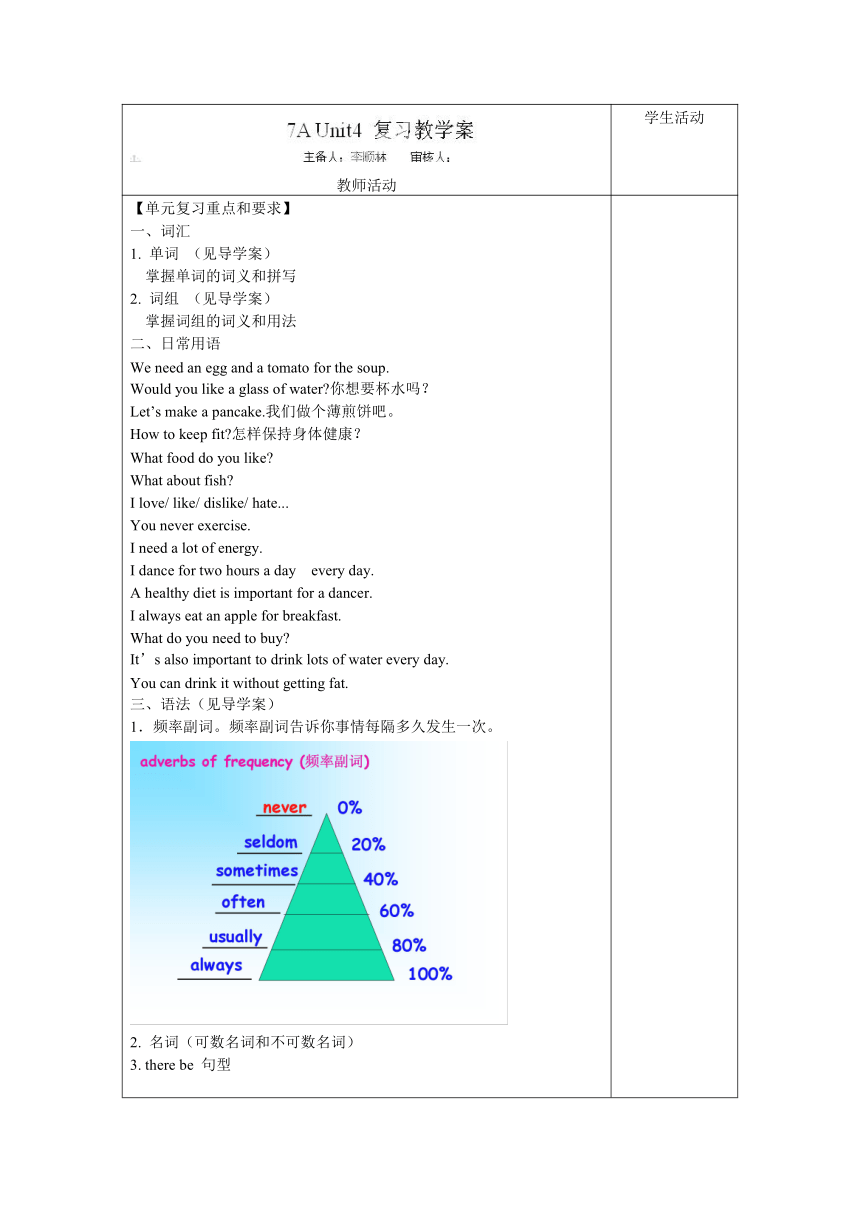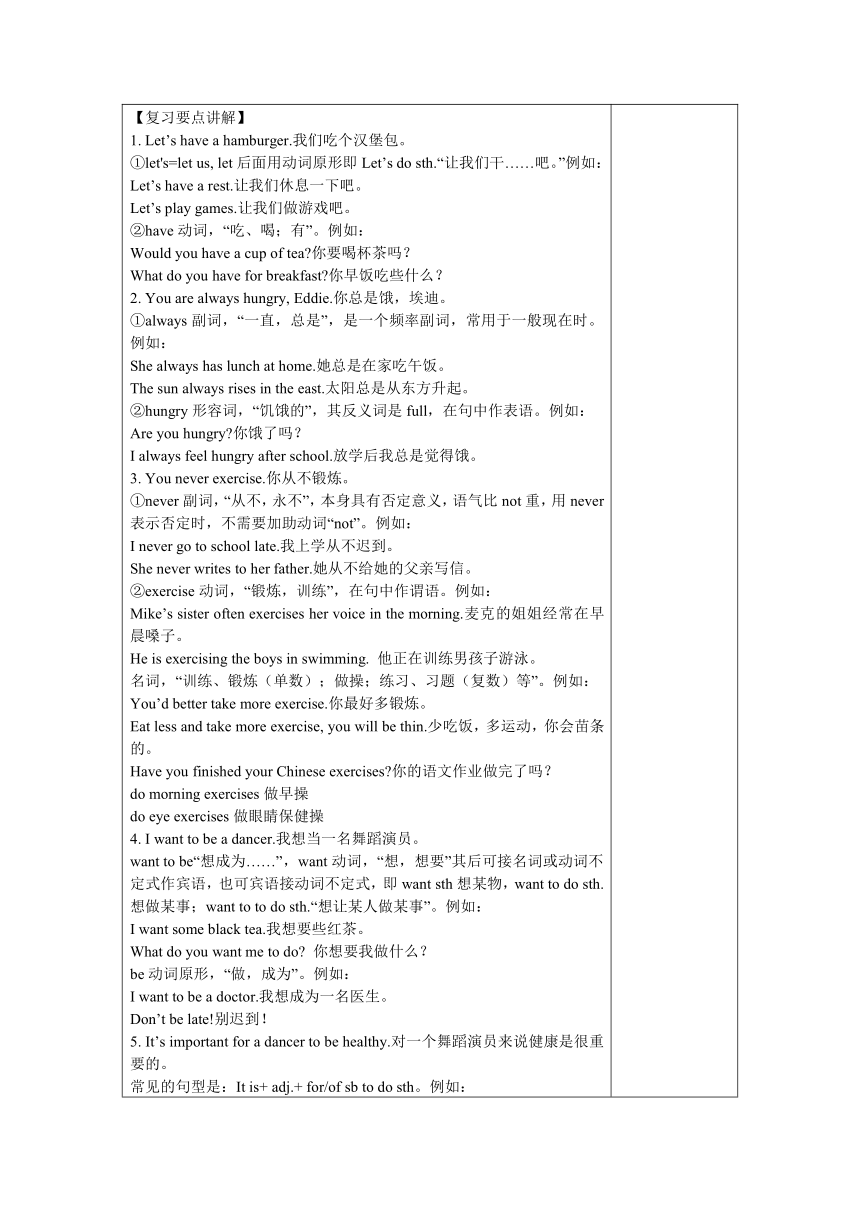牛津译林版初中英语7年级上册 Unit 4My day 复习教学案
文档属性
| 名称 | 牛津译林版初中英语7年级上册 Unit 4My day 复习教学案 |

|
|
| 格式 | zip | ||
| 文件大小 | 31.0KB | ||
| 资源类型 | 教案 | ||
| 版本资源 | 牛津译林版 | ||
| 科目 | 英语 | ||
| 更新时间 | 2014-07-30 00:00:00 | ||
图片预览


文档简介
教师活动 学生活动
【单元复习重点和要求】一、词汇1. 单词 (见导学案) 掌握单词的词义和拼写2. 词组 (见导学案) 掌握词组的词义和用法二、日常用语 We need an egg and a tomato for the soup. Would you like a glass of water 你想要杯水吗?Let’s make a pancake.我们做个薄煎饼吧。How to keep fit 怎样保持身体健康?What food do you like What about fish I love/ like/ dislike/ hate...You never exercise.I need a lot of energy.I dance for two hours a day every day.A healthy diet is important for a dancer.I always eat an apple for breakfast.What do you need to buy It’s also important to drink lots of water every day.You can drink it without getting fat.三、语法(见导学案)1.频率副词。频率副词告诉你事情每隔多久发生一次。2. 名词(可数名词和不可数名词)3. there be 句型【复习要点讲解】1. Let’s have a hamburger.我们吃个汉堡包。①let's=let us, let后面用动词原形即Let’s do sth.“让我们干……吧。”例如:Let’s have a rest.让我们休息一下吧。Let’s play games.让我们做游戏吧。②have动词,“吃、喝;有”。例如:Would you have a cup of tea 你要喝杯茶吗?What do you have for breakfast 你早饭吃些什么?2. You are always hungry, Eddie.你总是饿,埃迪。①always副词,“一直,总是”,是一个频率副词,常用于一般现在时。例如: She always has lunch at home.她总是在家吃午饭。 The sun always rises in the east.太阳总是从东方升起。 ②hungry形容词,“饥饿的”,其反义词是full,在句中作表语。例如: Are you hungry 你饿了吗?I always feel hungry after school.放学后我总是觉得饿。3. You never exercise.你从不锻炼。①never副词,“从不,永不”,本身具有否定意义,语气比not重,用never表示否定时,不需要加助动词“not”。例如:I never go to school late.我上学从不迟到。She never writes to her father.她从不给她的父亲写信。②exercise动词,“锻炼,训练”,在句中作谓语。例如:Mike’s sister often exercises her voice in the morning.麦克的姐姐经常在早晨嗓子。He is exercising the boys in swimming. 他正在训练男孩子游泳。名词,“训练、锻炼(单数);做操;练习、习题(复数)等”。例如:You’d better take more exercise.你最好多锻炼。Eat less and take more exercise, you will be thin.少吃饭,多运动,你会苗条的。Have you finished your Chinese exercises 你的语文作业做完了吗?do morning exercises做早操do eye exercises做眼睛保健操4. I want to be a dancer.我想当一名舞蹈演员。want to be“想成为……”,wa ( http: / / www.21cnjy.com )nt动词,“想,想要”其后可接名词或动词不定式作宾语,也可宾语接动词不定式,即want sth想某物,want to do sth.想做某事;want to to do sth.“想让某人做某事”。例如:I want some black tea.我想要些红茶。What do you want me to do 你想要我做什么? be动词原形,“做,成为”。例如:I want to be a doctor.我想成为一名医生。Don’t be late!别迟到!5. It’s important for a dancer to be healthy.对一个舞蹈演员来说健康是很重要的。常见的句型是:It is+ adj.+ for/of sb to do sth。例如:It is dangerous for children to swim in the river.孩子在这条河里游泳很危险。It was careless of you to do that.你这么做真粗心。6. Before, I seldom ate fruit and vegetables.以前,我不常吃水果和蔬菜。 seldom副词,“很少,不常、难得”,其反义词是often。通常置于行为动词之前;助动词和be动词之后。是一个表示否定意义的副词。例如:Mrs. Brown seldom goes out.布朗夫人很少外出。Millie is seldom late for school.米莉上学很少迟到。7. I ate a lot of sweet snacks between meals.在两餐之间我吃了许多甜食。between介词,“在(两者之间)”,后面可以跟名词或代词,跟代词时要用宾格。例如:Put the desk between us.把课桌放在我们俩中间。 between…and…“在……和……之间”,它限于两者之间;如果是三者之间或三者以上,要用介词among。between和and之间可以是两个人,也可以是两个不同的物或两个点(时间、数字、场所)。例如:Peter sat between Mary and Jane.彼得坐在玛丽和简之间。The shop opens between 9 a.m. and 5 p.m.商店在上午九点和下午五点间开门。Mary is sitting among the children.玛丽坐在孩子们之中。8. I know that sweet snacks are not good for me.我知道甜零食对我没有好处。be good for…“对……有益(有用)”,后接人或事物的名词。例如:Sunshine is good for your plants.你的花草要多晒太阳。Is this kind of food good for me 这种食物对我身体有益吗?This cream is good for bums.这种油膏治烧伤和烫伤很管事儿。Milk is good for children. 类似的固定词组还有:be good at“擅长,善于”, 后接名词,代词或动名词。例如:Kate is good at English.凯特擅长英语。Mike is good at playing football.麦克擅长绘画。be good to“对……好(和善、慈爱)”,后接表示人的或要格化的名词。例如:She is good to me.她对我好。9. Now, I always eat an apple for breakfast.现在,我总是早饭吃一个苹果。 eat sth. for breakfast/lunch/supper=have sth. for breakfast/lunch/supper“早饭/午饭/晚饭吃……”。例如:I ate some bread for ( http: / / www.21cnjy.com )breakfast.=I had some bread for breakfast.早饭我吃的面包。What did you eat for supper =What did you have for supper 晚饭你吃得什么?10. After class, I al ( http: / / www.21cnjy.com )so like playing computer games and chatting with my friends on the Internet. 课后,我也喜欢玩电子游戏和朋友们在网上聊天。 like doing sth.“喜欢干某事”,后面跟动名词表示习惯性的动作。playing和chatting属于名词短语,在句中作谓语动词的宾语。 play动词,①“玩,做(游戏),踢(球)”,可以构成以下的固定词组:play cards玩牌 play games做游戏 play football踢足球②“演奏,吹奏”,可以构成的固定词组有:play the piano 弹钢琴 play the violin 拉小提琴play with… 玩…… play with water 玩水play…with… 和……一起玩 play football with children 和孩子们一起踢足球chat动词,“闲谈,聊天”。例如:They are chatting in the room.他们在屋子里闲聊。Mrs Green likes chatting with the friends.格林夫人喜欢和朋友们聊天。11. Now, I exercise every day for about 30 minutes.现在,我每天锻炼大约30分钟。 for介词,表示时间时指一段时间,其后表示时间的名词往往用复数形式。I stayed in Shanghai for three months.我在上海呆了三个月。He will study in this school for four years.他将在这个学校学习四年。12. I swim twice a week.每周我游泳两次。 twice副词,“两次,两倍”,一次用once,表示三次以上用“基数词+times”。例如:three times三次 many times许多次twice=two tim ( http: / / www.21cnjy.com )es, 通常多用twice, 如:twice a day 一天两次 Twice two is four.二二得四。13. How often does Kitty dance 基蒂每隔多久跳一次舞? How often指动作发生的频率,即 ( http: / / www.21cnjy.com )每多少时间进行一次,常与一般现在时或一般过去时连用,回答一般是once a week, twice a month, every two days, sometimes, quite often等。例如:How often do you go and see your grandfather 你每隔多久去看你爷爷一次?Once a week.每周一次。How often did he write to you 他每隔多久给你写一封信?Every two weeks.每两周一次。14. Where did Kitty get her energy from 基蒂从哪儿获得她的能量?get…from…“从……获得(得到)……”,例如:We get some eggs and chicken from chickens.我们从鸡身上得到鸡蛋和鸡肉。What can we get from cow 我们从牛身上可以得到什么?15. a cold drink冷饮,其反义词组是a hot drink热饮 drink 在这课里是名词,“饮料”。例如:bottled drinks 还可以作及物动词,“饮,喝”,如:drink a glass of water喝杯水drink a cup of tea喝杯茶 也还可以作不及物动词,“喝酒、酗酒”。例如:He doesn’t drink.他没有喝酒的习惯。 My uncle often drinks hard.我叔叔经常酗酒。【复习巩固练习】一.单词拼写。 1. We must do our homework __________(仔细)。 2. Their ________(小刀)are all old.. I want a new one. 3. Is that _________(建筑物) a hotel or shop 4. Good morning, ________(孩子), are we all here now 5. Today is ________(星期二), February 18th. I’m on duty.二.单项选择 1. He goes to school by bus, but he walks ______ after school. A. to home B. home C. his home D. the home 2. The group of ( http: / / www.21cnjy.com )soldiers arrived ______ a small town ______ a rainy morning. A. at; on B. at; in C. in; on D. in; in 3. I like reading. I often go to _____. A. the classroom B. the Reading Club C. the teacher’s office D. the bus 4. It is importa ( http: / / www.21cnjy.com )nt ______ us students to make a plan _______ our students before a new term starts. A. for; for B. of; for C. to; of D. with; on 5. Excuse me, _______ do you say that in English A. how B. who C. where D. what 6. ---Do you have a pencil --- ________. A. Yes, I can. B. Yes, I do. C. No, I’m not D. No, I do 7. --- Can I _______ your new watch ---- Sure. A. look at B. look after C. look for D. look like 8. Jack _____ doing his homework at eight. A. finish B. finishs C. finishes D. don’t finish 9. ---______ the boys enjoy ______ the World Cup --- Yes, they ______. A. Does; watching; does B. Do; watch; do C. Do; watching; do D. Does; watch; does10. He says “________” to his parents before he goes to bed. A. Good evening B., Goodbye C. Going to bed D. Good night
【单元复习重点和要求】一、词汇1. 单词 (见导学案) 掌握单词的词义和拼写2. 词组 (见导学案) 掌握词组的词义和用法二、日常用语 We need an egg and a tomato for the soup. Would you like a glass of water 你想要杯水吗?Let’s make a pancake.我们做个薄煎饼吧。How to keep fit 怎样保持身体健康?What food do you like What about fish I love/ like/ dislike/ hate...You never exercise.I need a lot of energy.I dance for two hours a day every day.A healthy diet is important for a dancer.I always eat an apple for breakfast.What do you need to buy It’s also important to drink lots of water every day.You can drink it without getting fat.三、语法(见导学案)1.频率副词。频率副词告诉你事情每隔多久发生一次。2. 名词(可数名词和不可数名词)3. there be 句型【复习要点讲解】1. Let’s have a hamburger.我们吃个汉堡包。①let's=let us, let后面用动词原形即Let’s do sth.“让我们干……吧。”例如:Let’s have a rest.让我们休息一下吧。Let’s play games.让我们做游戏吧。②have动词,“吃、喝;有”。例如:Would you have a cup of tea 你要喝杯茶吗?What do you have for breakfast 你早饭吃些什么?2. You are always hungry, Eddie.你总是饿,埃迪。①always副词,“一直,总是”,是一个频率副词,常用于一般现在时。例如: She always has lunch at home.她总是在家吃午饭。 The sun always rises in the east.太阳总是从东方升起。 ②hungry形容词,“饥饿的”,其反义词是full,在句中作表语。例如: Are you hungry 你饿了吗?I always feel hungry after school.放学后我总是觉得饿。3. You never exercise.你从不锻炼。①never副词,“从不,永不”,本身具有否定意义,语气比not重,用never表示否定时,不需要加助动词“not”。例如:I never go to school late.我上学从不迟到。She never writes to her father.她从不给她的父亲写信。②exercise动词,“锻炼,训练”,在句中作谓语。例如:Mike’s sister often exercises her voice in the morning.麦克的姐姐经常在早晨嗓子。He is exercising the boys in swimming. 他正在训练男孩子游泳。名词,“训练、锻炼(单数);做操;练习、习题(复数)等”。例如:You’d better take more exercise.你最好多锻炼。Eat less and take more exercise, you will be thin.少吃饭,多运动,你会苗条的。Have you finished your Chinese exercises 你的语文作业做完了吗?do morning exercises做早操do eye exercises做眼睛保健操4. I want to be a dancer.我想当一名舞蹈演员。want to be“想成为……”,wa ( http: / / www.21cnjy.com )nt动词,“想,想要”其后可接名词或动词不定式作宾语,也可宾语接动词不定式,即want sth想某物,want to do sth.想做某事;want to to do sth.“想让某人做某事”。例如:I want some black tea.我想要些红茶。What do you want me to do 你想要我做什么? be动词原形,“做,成为”。例如:I want to be a doctor.我想成为一名医生。Don’t be late!别迟到!5. It’s important for a dancer to be healthy.对一个舞蹈演员来说健康是很重要的。常见的句型是:It is+ adj.+ for/of sb to do sth。例如:It is dangerous for children to swim in the river.孩子在这条河里游泳很危险。It was careless of you to do that.你这么做真粗心。6. Before, I seldom ate fruit and vegetables.以前,我不常吃水果和蔬菜。 seldom副词,“很少,不常、难得”,其反义词是often。通常置于行为动词之前;助动词和be动词之后。是一个表示否定意义的副词。例如:Mrs. Brown seldom goes out.布朗夫人很少外出。Millie is seldom late for school.米莉上学很少迟到。7. I ate a lot of sweet snacks between meals.在两餐之间我吃了许多甜食。between介词,“在(两者之间)”,后面可以跟名词或代词,跟代词时要用宾格。例如:Put the desk between us.把课桌放在我们俩中间。 between…and…“在……和……之间”,它限于两者之间;如果是三者之间或三者以上,要用介词among。between和and之间可以是两个人,也可以是两个不同的物或两个点(时间、数字、场所)。例如:Peter sat between Mary and Jane.彼得坐在玛丽和简之间。The shop opens between 9 a.m. and 5 p.m.商店在上午九点和下午五点间开门。Mary is sitting among the children.玛丽坐在孩子们之中。8. I know that sweet snacks are not good for me.我知道甜零食对我没有好处。be good for…“对……有益(有用)”,后接人或事物的名词。例如:Sunshine is good for your plants.你的花草要多晒太阳。Is this kind of food good for me 这种食物对我身体有益吗?This cream is good for bums.这种油膏治烧伤和烫伤很管事儿。Milk is good for children. 类似的固定词组还有:be good at“擅长,善于”, 后接名词,代词或动名词。例如:Kate is good at English.凯特擅长英语。Mike is good at playing football.麦克擅长绘画。be good to“对……好(和善、慈爱)”,后接表示人的或要格化的名词。例如:She is good to me.她对我好。9. Now, I always eat an apple for breakfast.现在,我总是早饭吃一个苹果。 eat sth. for breakfast/lunch/supper=have sth. for breakfast/lunch/supper“早饭/午饭/晚饭吃……”。例如:I ate some bread for ( http: / / www.21cnjy.com )breakfast.=I had some bread for breakfast.早饭我吃的面包。What did you eat for supper =What did you have for supper 晚饭你吃得什么?10. After class, I al ( http: / / www.21cnjy.com )so like playing computer games and chatting with my friends on the Internet. 课后,我也喜欢玩电子游戏和朋友们在网上聊天。 like doing sth.“喜欢干某事”,后面跟动名词表示习惯性的动作。playing和chatting属于名词短语,在句中作谓语动词的宾语。 play动词,①“玩,做(游戏),踢(球)”,可以构成以下的固定词组:play cards玩牌 play games做游戏 play football踢足球②“演奏,吹奏”,可以构成的固定词组有:play the piano 弹钢琴 play the violin 拉小提琴play with… 玩…… play with water 玩水play…with… 和……一起玩 play football with children 和孩子们一起踢足球chat动词,“闲谈,聊天”。例如:They are chatting in the room.他们在屋子里闲聊。Mrs Green likes chatting with the friends.格林夫人喜欢和朋友们聊天。11. Now, I exercise every day for about 30 minutes.现在,我每天锻炼大约30分钟。 for介词,表示时间时指一段时间,其后表示时间的名词往往用复数形式。I stayed in Shanghai for three months.我在上海呆了三个月。He will study in this school for four years.他将在这个学校学习四年。12. I swim twice a week.每周我游泳两次。 twice副词,“两次,两倍”,一次用once,表示三次以上用“基数词+times”。例如:three times三次 many times许多次twice=two tim ( http: / / www.21cnjy.com )es, 通常多用twice, 如:twice a day 一天两次 Twice two is four.二二得四。13. How often does Kitty dance 基蒂每隔多久跳一次舞? How often指动作发生的频率,即 ( http: / / www.21cnjy.com )每多少时间进行一次,常与一般现在时或一般过去时连用,回答一般是once a week, twice a month, every two days, sometimes, quite often等。例如:How often do you go and see your grandfather 你每隔多久去看你爷爷一次?Once a week.每周一次。How often did he write to you 他每隔多久给你写一封信?Every two weeks.每两周一次。14. Where did Kitty get her energy from 基蒂从哪儿获得她的能量?get…from…“从……获得(得到)……”,例如:We get some eggs and chicken from chickens.我们从鸡身上得到鸡蛋和鸡肉。What can we get from cow 我们从牛身上可以得到什么?15. a cold drink冷饮,其反义词组是a hot drink热饮 drink 在这课里是名词,“饮料”。例如:bottled drinks 还可以作及物动词,“饮,喝”,如:drink a glass of water喝杯水drink a cup of tea喝杯茶 也还可以作不及物动词,“喝酒、酗酒”。例如:He doesn’t drink.他没有喝酒的习惯。 My uncle often drinks hard.我叔叔经常酗酒。【复习巩固练习】一.单词拼写。 1. We must do our homework __________(仔细)。 2. Their ________(小刀)are all old.. I want a new one. 3. Is that _________(建筑物) a hotel or shop 4. Good morning, ________(孩子), are we all here now 5. Today is ________(星期二), February 18th. I’m on duty.二.单项选择 1. He goes to school by bus, but he walks ______ after school. A. to home B. home C. his home D. the home 2. The group of ( http: / / www.21cnjy.com )soldiers arrived ______ a small town ______ a rainy morning. A. at; on B. at; in C. in; on D. in; in 3. I like reading. I often go to _____. A. the classroom B. the Reading Club C. the teacher’s office D. the bus 4. It is importa ( http: / / www.21cnjy.com )nt ______ us students to make a plan _______ our students before a new term starts. A. for; for B. of; for C. to; of D. with; on 5. Excuse me, _______ do you say that in English A. how B. who C. where D. what 6. ---Do you have a pencil --- ________. A. Yes, I can. B. Yes, I do. C. No, I’m not D. No, I do 7. --- Can I _______ your new watch ---- Sure. A. look at B. look after C. look for D. look like 8. Jack _____ doing his homework at eight. A. finish B. finishs C. finishes D. don’t finish 9. ---______ the boys enjoy ______ the World Cup --- Yes, they ______. A. Does; watching; does B. Do; watch; do C. Do; watching; do D. Does; watch; does10. He says “________” to his parents before he goes to bed. A. Good evening B., Goodbye C. Going to bed D. Good night
同课章节目录
- 预备课程
- Lesson 1 Nice to meet you !
- Lesson 2 A happy family
- Lesson 3 A nice school
- Lesson 4 You look cool !
- Lesson 5 Wonderful things
- Lesson 6 Have nice food
- Lesson 7 Enjoy our days
- Lesson 8 Let's have fun !
- Unit 1 This is me
- Unit 2 Let's play sports
- Unit 3 Welcome to our school
- Unit 4 My day
- Unit 5 Let’s celebrate
- Unit 6 Food and lifestyle
- Unit 7 Shopping
- Unit 8 Fashion
